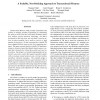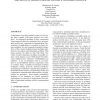628 search results - page 35 / 126 » Tying Memory Management to Parallel Programming Models |
109
Voted
HPCA
2007
IEEE
16 years 3 months ago
2007
IEEE
Transactional Memory (TM) provides mechanisms that promise to simplify parallel programming by eliminating the need for locks and their associated problems (deadlock, livelock, pr...
108
Voted
SPAA
2003
ACM
15 years 7 months ago
2003
ACM
Recent research on processor microarchitecture suggests using instruction criticality as a metric to guide hardware control policies. Fields et al. [3, 4] have proposed a directed...
108
Voted
IPPS
2008
IEEE
15 years 9 months ago
2008
IEEE
Transactional memory systems promise to reduce the burden of exposing thread-level parallelism in programs by relieving programmers from analyzing complex inter-thread dependences...
125
Voted
WSC
1997
15 years 4 months ago
1997
Components of modern parallel systems are becoming quite complex with many features and variations. An integrated modeling of these components (interconnection network, messaging ...
129
click to vote
ISCA
1998
IEEE
15 years 6 months ago
1998
IEEE
Future parallel computers must efficiently execute not only hand-coded applications but also programs written in high-level, parallel programming languages. Today's machines ...


